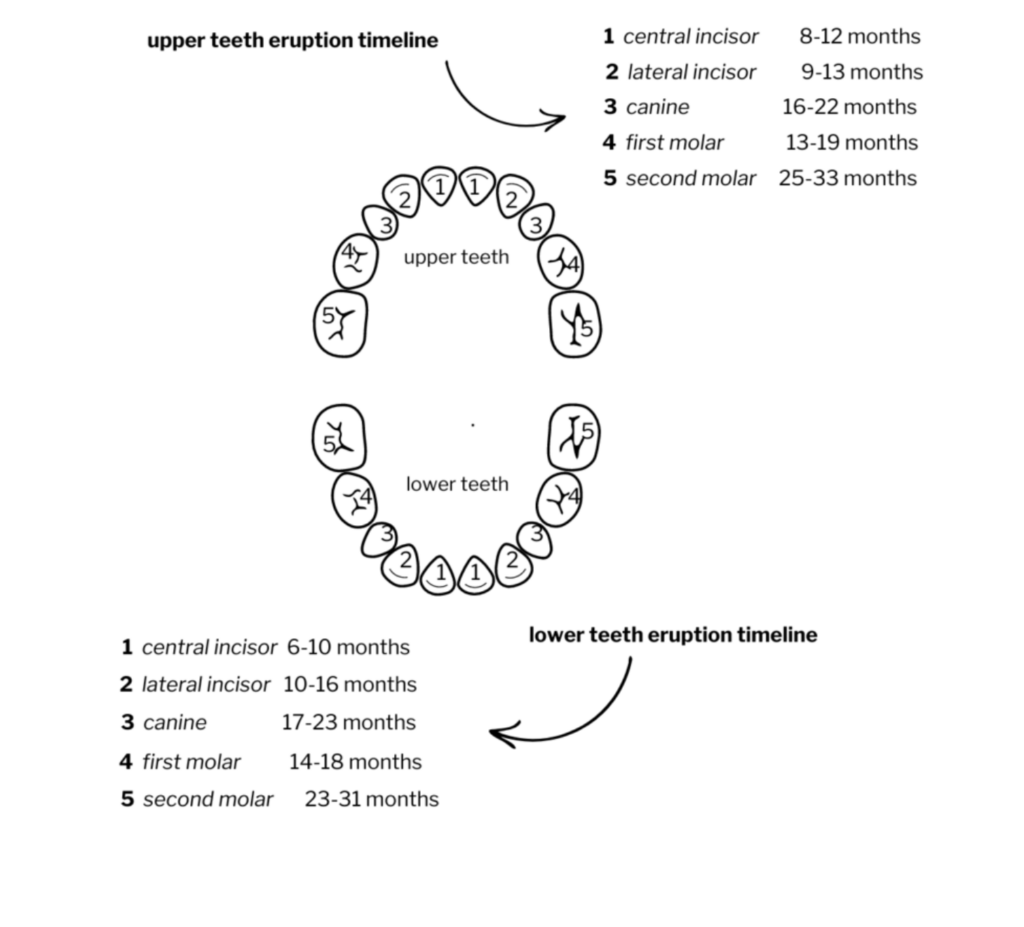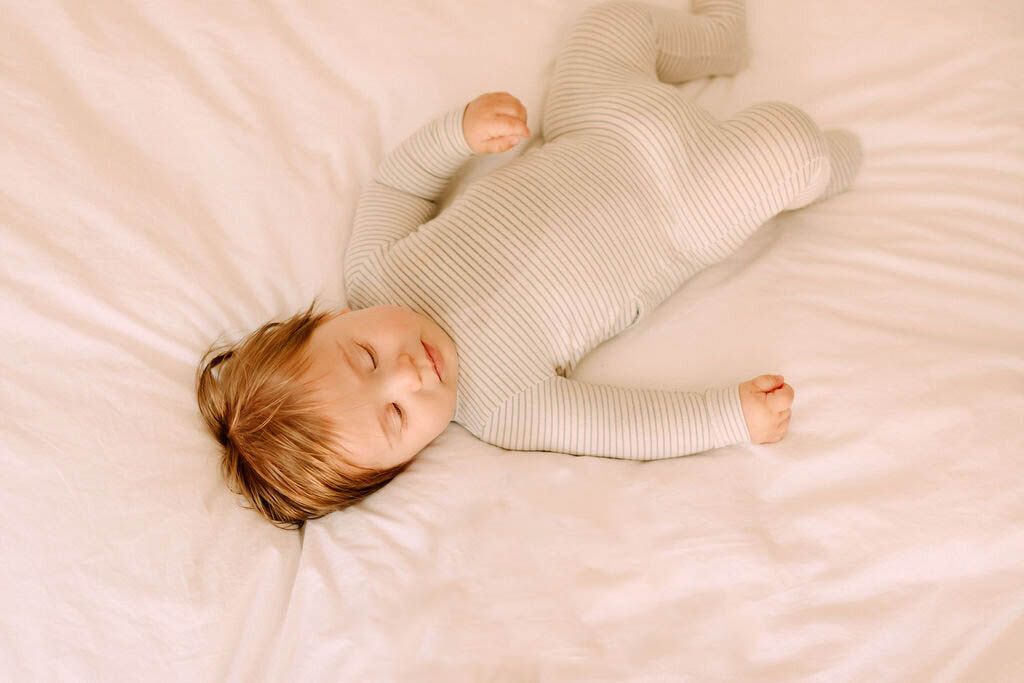Teething can feel so tricky for parents. On the one hand, teething is often the first thing that comes to mind when sleep goes awry. For good reason- it really can impact sleep in a big way. But it’s not always the culprit. So how do you actually know? Is it teething that’s getting in the way of your baby’s sleep? Or is it something else? And why does it feel so hard to figure it out?
The first thing to do is to know what true teething symptoms are. And to know what symptoms are not teething-related.
Less Common Symptoms
Common Teething Symptoms
- Drooling
- Swollen or red gums
- Seeing white nubs under gumline
- Lots of biting or sucking
- Wanting to breastfeed more frequently
- Irritability and fussiness
- Rise in body temperature (99-100.4F)
- Change in appetite
- Change in sleep
- Pulling at ears
- Digestive discomfort
- Diarrhea
- Agitation and intense irritability
- Fever over 100.4
- Lethargy
- Rash around mouth, chin or diaper area
Then, there are symptoms that are unrelated to teething. If your baby is displaying any of these symptoms, that’s usually a sign that something else is at play.
Non-Teething Symptoms
- Weeks of disrupted sleep
- High Fever
- Refusal to eat
- Cough
- Body Rash
- Intense or hysterical crying
Teething symptoms typically happen for a few days before and after the eruption of each tooth. They don’t last for weeks on end.
When does teething start?
While some babies teeth earlier or later, teething usually starts around 4-6 months. At around 2-3 months, the salivary glands reach their full capacity – and that’s when babies start to drool a lot more. Parents often assume drooling equals teething, but it’s not always the case! At this stage, babies also begin to bring their hands to their mouths, which can seem even more like teething!
Here are the general time frames you can expect to see some new teeth in that tiny mouth. Remember that all babies are unique and develop on their own timeline. So don’t stress if your baby doesn’t match these numbers!

As you can see from this chart, teething happens on and off for your baby’s first 3 years of life. Some teeth come in at the same time, and some teeth pop up without any symptoms or warning. Babies don’t have disrupted sleep for three years solely due to teething. Sometimes, teeth can come in back-to-back, which will cause a longer teething period, but even that won’t be more than a couple of weeks at most.
Tylenol (babies under 6 months) as directed by your pediatrician
Motrin (babies over 6 months) as directed by your pediatrician. This has anti-inflammatory properties and lasts longer than Tylenol.
Teething toys

Gum Massage
Wet washcloth kept in freezer for 30 minutes
Breastmilk popsicles
Homeopathic remedies (check with your pediatrician before using)
Lots and lots of extra breastfeeding!
Contact napping so baby can lay upright (teething pain is worse when baby is laying flat)
Motrin for babies under 6 months
Amber necklaces- choking and strangulation hazard
Numbing gels (often contain benzocaine, a very harmful ingredient)
Teething toys with gel filling (these can explode and baby can eat the filling)
Popsicles for babies under 6 months (wait till baby can hold independently)
Teething and sleep are not friends. What can I say? They just don’t get along. It’s important to remember that when our babies are teething, they really are suffering. We need to offer them support and compassion while we all try and get some sleep. Here are my best tips to optimize sleep during a teething stage:

Pain relief before bedtime
Whether you’re going the natural homeopathic route or using Motrin, it can be helpful to offer your baby pain relief 30 minutes before bedtime. This allows some time for the relief to kick in so that baby won’t feel distress at bedtime. Do this under the direction of your pediatrician.
Sleep is the best medicine
Research shows that when we don’t get enough sleep, we’re more sensitive to pain. Helping your baby get sleep can make the teething stage more bearable for them. This may mean supporting your baby in ways that you usually choose not to do, such as night feedings or coming into your bed.
Maintain Routine
Keep a consistent naptime schedule and bedtime routine for your baby. No, sleep will not always follow – that’s to be expected. Holding the framework in place for your baby will give more opportunity for sleep and maintain a baseline that you can return to once the teething pain fades.
Anticipate nights based on daytime demeanor
This isn’t a guarantee, but often daytime behavior will give you a clue as to what’s coming at night. If your baby is fussy, warm and irritable during the daytime, get into bed early that night – it may mean more frequent night wakings that night.
Keep context in mind
Research shows that teething symptoms last 24-72 hours before the tooth erupts. Practically, this means 2-3 rough nights. (Once you see the head of the tooth poking through, we assume most of the pain has passed). If your baby is waking frequently for weeks at a time, that’s likely not teething-related.
Some babies seem to do ok during the day and only get really fussy at night while in a teething stage. This can happen because at night
- they’re less distracted
- they’re eating/breastfeeding/bottle feeding less
- laying flat increases teething pain
- cortisol levels (anti inflammatory hormone) are lower at night
Summary
In short, teething is real, and it can cause real distress to your baby. And it doesn’t last for weeks at at a time. If you’re struggling with fragmented nights for weeks on end, be sure to check out my Baby Sleep Course, for babies 4-24 months. In this course you’ll learn a step-by-step customizable plan for better nights with no Ferber or Cry It Out methods. You can find that here.

Comments +